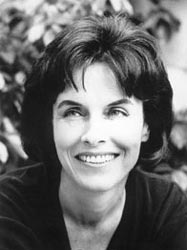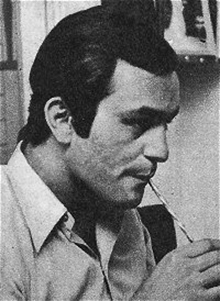Related Research Articles
Jorge Raúl Porcel de Peralta, known as Jorge Porcel, was an Argentine comedy actor and television host. He was nicknamed El Gordo de América. Porcel is considered, along with Alberto Olmedo, one of Argentina's greatest comic actors of the twentieth century.
Luis Alberto Spinetta, nicknamed "El Flaco", was an Argentine singer, guitarist, composer, writer and poet. One of the most influential rock musicians of Argentina, he is widely regarded as one of the founders of Argentine rock, which is considered as the first incarnation of Spanish-language rock. Born in Buenos Aires in the residential neighbourhood of Belgrano, he was the founder of iconic rock bands including Almendra, Pescado Rabioso, Invisible, Spinetta Jade, and Spinetta y Los Socios del Desierto. In Argentina January 23rd is celebrated as "Día Nacional del Músico" in honor of Spinetta's birth.
Patricio Rey y sus Redonditos de Ricota, also known simply as Patricio Rey, Los Redondos or Los Redonditos de Ricota, was a rock band formed in La Plata, Argentina. The group was active from the mid 70s up to the early 2000s. They are known for shaping Argentine rock and their enormous fan base.

The Estadio Tomás A. Ducó is a football stadium in Argentina, located in the Parque Patricios neighborhood of Buenos Aires. The stadium is the home ground of Club Atlético Huracán and has a capacity of 48,314 spectators.

The following is an alphabetical list of topics related to the Argentina.

Cinema of Argentina refers to the film industry based in Argentina. The Argentine cinema comprises the art of film and creative movies made within the nation of Argentina or by Argentine filmmakers abroad.

María Luisa Bemberg was an Argentine film writer, director and actress. She was one of the first Argentine female directors with a powerful presence both in the filmmaking and the intellectual world of Latin America, particularly during her most active period, from 1970 to 1990.

Olga Zubarry was an Argentine actress who appeared in film between 1943 and 1997. She made over 60 appearances in film, spanning six decades of Argentine cinema, but is best known for her work during the Golden Age of Argentine Cinema. Throughout the course of her career, she received four Silver Condor Awards, two Martín Fierro Awards, a Konex Foundation Award and several others for her films and television performances. She is credited with starring in the first film in Argentina which featured nudity, though only her back was shown and she stated repeatedly that she wore a flesh-colored mesh and was not truly nude.

The cinema of Paraguay has historically been small. However, this has begun to change in recent years with films like El Toque del Oboe (1998); María Escobar (2002); O Amigo Dunor (2005), which competed for Best Movie in the Rotterdam International Film Festival; Hamaca Paraguaya (2006), which was screened at the Cannes Film Festival, gaining critical acclaim both in Paraguay and abroad; 7 cajas (2012); Latas Vacías (2014); and Luna de Cigarras (2014).

Héctor Pastor Bidonde was an Argentine actor.
Lucio Godoy is a Spanish-Argentine film composer and music producer.

Fuad Jorge Jury, better known by his stage name Leonardo Favio, was an Argentine singer, actor and filmmaker. He is considered one of Argentina's best film directors and one of the country's most enduring cultural figures, as well as a popular singer-songwriter throughout Latin America.

Chilean cinema refers to all films produced in Chile or made by Chileans. It had its origins at the start of the 20th century with the first Chilean film screening in 1902 and the first Chilean feature film appearing in 1910. The oldest surviving feature is El Húsar de la Muerte (1925), and the last silent film was Patrullas de Avanzada (1931). The Chilean film industry struggled in the late 1940s and in the 1950s, despite some box-office successes such as El Diamante de Maharajá. The 1960s saw the development of the "New Chilean Cinema", with films like Three Sad Tigers (1968), Jackal of Nahueltoro (1969) and Valparaíso mi amor (1969). After the 1973 military coup, film production was low, with many filmmakers working in exile. It increased after the end of the Pinochet regime in 1989, with occasional critical and/or popular successes such as Johnny cien pesos (1993), Historias de Fútbol (1997) and Gringuito (1998).
Patricio Coll is a movie director from Argentina who has worked in film, video and TV, both in Argentina and Venezuela and Spain. He currently resides in Santa Fe.

Mónica Villa is an Argentine actress of stage, screen, and TV, as well as a researcher and educator. She earned a Best Actress award for her role as "Susana" in cult classic "Esperando la Carroza at the 1985 Festival de Cine Iberoamericano, in Huelva, Spain. She won an ACE Golden award for best leading actress in the 2002 comedy "Ojos traidores", a 2004 Premios Trinidad Guevara for best Actress of a Repertoire Company, a Premios Carlos de Oro for her 2011 performance as best lead actress in the theater production "Jardín De Otoño", and in 2015 a Premios Estrella de Mar for Best Female Performance in a Repertoire Company for "La Nona". In addition, she has been nominated for a Best Actress in a TV Special for the 2003 Premios Martín Fierro, making her acting work recognized in all three major media.
Augusto Jorge Mateo Solari is an Argentine professional footballer who plays for Atlas FC as a right winger.
Aurelia Del Carmen Guarini is an Argentine anthropologist, teacher, film director, and film producer specializing in anthropological documentary films. She teaches visual anthropology and directs documentaries in Argentina and in Cuba. She serves on the documentary projects' evaluation committee at the National Institute of Cinema and Audiovisual Arts and participates in Cine Ojo projects.

Champions is a 2018 Spanish sports comedy-drama film directed by Javier Fesser and written by Fesser and David Marqués. It was selected as the Spanish entry for the Best Foreign Language Film at the 91st Academy Awards, but it was not nominated.

Gonzalo Calzada is an Argentine filmmaker and writer, best known for his directoral work on fantasy and horror films. His film Luisa was awarded the best "opera prima" at the 33rd Cairo International Film Festival in 2009. His film Resurrection achieved historic box office rankings for its genre in Argentina. Calzada's work is internationally recognized by film critics.

Graciela Araujo was an Argentine film and TV actor.
References
- 1 2 "JORGE GOLDENBERG" (PDF). Festival Internacional de cine de Donostia-San Sebastiá. Retrieved 2010-11-09.
- ↑ Jorge Goldenberg at IMDb